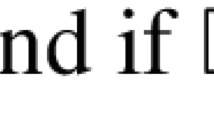Abstract
The psychological orientation treats semantics as a matter of idealized computation over symbolic structures, and semantic relations like denotation as relations between linguistic expressions and these structures. I argue that results similar to Gödel’s incompleteness theorems and Tarski’s theorem on truth create foundational difficulties for this view of semantics.
Similar content being viewed by others
References
Asher, N., & Kamp, J. A. W. (1986). The knower’s paradox and representational theories of attitudes. In Halpern, J. Y. (Ed.), Theoretical aspects of reasoning about knowledge: Proceedings of the first conference (pp. 131–147). Los Altos: Morgan Kaufmann.
Benacerraf, P. (1973). Mathematical truth. Journal of Philosophy, 70, 661–679.
Cresswell, M. (1978). Semantic competence. In Guenthner, F. & Guenthner-Reutter, M. (Eds.), Meaning and translation: Philosophical and logical approaches (pp. 9–227). New York: New York University Press.
Cresswell, M. J. (1985). Structured meanings. Cambridge: MIT Press.
Cresswell, M. J. (2002). Why propositions have no structure. Noûs, 36(4), 643–662.
Cross, C. B. (2001). The paradox of the knower without epistemic closure. Mind, New Series, 110(438), 319–333.
Frege, G. (1953). The foundations of arithmetic (2nd ed.). Oxford: Oxford University Press (Translated by J. L. Austin).
Hazen, A. P. (1976). Expressive completeness in modal language. Journal of Philosophical Logic, 5(1), 25–46.
Hintikka, J. (1962). Knowledge and belief. Ithaca: Cornell University Press.
Jackendoff, R. (1976). Toward an explanatory semantic representation. Linguistic Inquiry, 7, 89–150.
Kasher, A. (1976). Logical rationalism: On degrees of adequacy for semantics of natural languages. Philosophica, 18, 139–157.
Katz, J. J. (1972). Semantic theory. New York: Harper and Row.
Katz, J. J. (1977). The advantage of semantic theory over predicate calculus in the representation of logical form in natural language. The Monist, 60, 303–326.
King, J. C. (2007). The nature and structure of content. Oxford: Oxford University Press.
Kripke, S. (1975). Outline of a theory of truth. Journal of Philosophy, 72, 690–715.
Lakoff, G. (1971). On generative semantics. In Steinberg, D. D. & Jacobovits, L. A. (Eds.), Semantics: An interdisciplinary reader in philosophy, linguistics, and psychology (pp. 232–296). Cambridge: Cambridge University Press.
Lucas, J. R. (1961). Minds, machines, and Gödel. Philosophy, 36, 112–127.
Montague, R. (1963). Syntactical treatments of modality, with corollaries on reflection principles and finite axiomatizability. Acta Philosophica Fennica, 16, 153–167.
Montague, R. (1974). Formal philosophy: Selected papers of Richard M ontague. New Haven: Yale University Press.
Partee, B. (1977). Possible worlds semantics and linguistic theory. The Monist, 60, 303–326.
Partee, B. (1979). Semantics—mathematics or psychology? In Bäuerle, R., Engli, U., & von Stechow, A. (Eds.), Semantics from different points of view. Berlin: Springer.
Ramsey, F. P. (1927). Facts and propositions. Proceedings of the Aristotelian Society Supplementary Volume, 7, 153–170.
Reinhardt, W. N. (1986). Epistemic theories and the interpretation of Gödel’s incompleteness theorem. Journal of Philosophical Logic, 15(4), 427–474.
Tarski, A. (1936). Der Wahrheitsbegriff in den formalizierten Sprachen. Studia Philosophica, 1, 261–405.
Thomason, R. H. (1980). A model theory for propositional attitudes. Linguistics and Philosophy, 4, 47–70.
Author information
Authors and Affiliations
Corresponding author
Additional information
Notes on this manuscript. I’m not sure of the exact date, but I believe that work on this paper was begun in 1978. Versions of it were privately distributed in 1979, and in 1979 and 1980 it was presented as a talk on at least three different occasions. The draft that is reproduced here dates to 1983, with only very minor changes.
Rights and permissions
About this article
Cite this article
Thomason, R.H. Some Limitations to the Psychological Orientation in Semantic Theory. J Philos Logic 40, 1–14 (2011). https://doi.org/10.1007/s10992-010-9151-5
Received:
Accepted:
Published:
Issue Date:
DOI: https://doi.org/10.1007/s10992-010-9151-5



